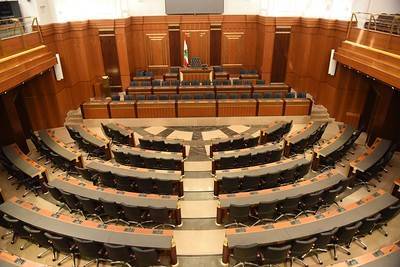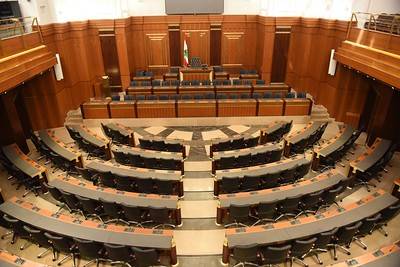In light of the stagnation in international efforts to resolve the stalled Lebanese presidential file, which has been stuck for a year and a half, Lebanese political forces occasionally resort to proposing solutions to the crisis, even if a considerable portion of these proposals purely serves to unsettle opponents. The latest of these is the proposal made by the leading presidential candidate, the head of the Marada Movement, Sleiman Frangieh, to the French presidential envoy Jean-Yves Le Drian, which is to elect the president directly by the people. This proposal is not new in the corridors of Lebanese politics; it was previously raised in 2014 during the presidential vacancy by Christian leader General Michel Aoun (before his election as president in 2016), who called for amending the constitution to elect a new president by direct vote. Recently, this proposal has been developed by the head of the Free Patriotic Movement, MP Gebran Bassil, who called for conducting presidential elections in two rounds: one for Christians only and a second for all Lebanese. According to information from "Asharq Al-Awsat," Frangieh does not oppose holding such elections in two rounds and believes he can secure Christian and national majorities.
Aoun: A Proposal with Reservations
MP Alan Aoun, a member of the Strong Lebanon bloc, views the idea of conducting direct presidential elections as a proposal that effectively makes the election process automatic, avoiding the delays and paralysis that currently occur due to the lack of a majority for voting and the absence of consensus to secure that majority. He cautions, however, that this option carries risks in light of the Lebanese confessional political system, which is based on a very delicate balance among sects and their positions and powers, thus requiring not only constitutional amendments but also numerous controls to maintain this balance. This includes conducting elections in two rounds: the first at the sectarian level and the second at the national level. In a statement to "Asharq Al-Awsat," Aoun notes that transitioning to this radical change in presidential elections requires national consensus to amend the constitution, which is currently unavailable, or a shift to a political system that abolishes confessionalism, which is impossible in the foreseeable future.
Ayyoub: A Distraction
For her part, MP Ghada Ayyoub, a member of the Strong Republic bloc, believes that those proposing the issue of direct presidential elections want to divert attention from the deliberate and apparent obstruction practiced by the resistance team, emphasizing that this proposal requires a constitutional amendment, reopening discussions that might not end under a constitution that has not been applied to its fundamental sovereign provisions. Ayyoub adds to "Asharq Al-Awsat": Opening this door is accompanied by various proposals in this area, ranging from Christian qualification and national voting to numerical democracy, leading to endless discussions. She argues that claiming there is a presidential impasse is inaccurate, stating that this impasse is artificially created and results from the failure to implement the constitution.
MP Bilal Abdullah from the Democratic Gathering clarifies that any amendment to the (Taif Agreement) regarding the presidency or otherwise requires national consensus and a stable environment for discussion, noting that it should come as part of a set of reforms to the (Taif Agreement) related to all political authority, not just the presidency. He mentions to "Asharq Al-Awsat" that currently, this is perhaps not the right time to raise such a proposal, although he acknowledges the importance of having a president elected by the people as an excellent democratic option.
Khayr: No to Creating New Norms
Similarly, MP Ahmed Khayr from the National Moderation bloc insists on adhering to the Taif Constitution, which defines the mechanisms for electing the president of the republic. He states: We certainly do not support any proposal that would leap over the (Taif Constitution) to create new norms in national entitlements. Thus, we have presented a Lebanese initiative for a solution, under the umbrella of the (Taif Constitution), which starts with consultations for a specified period and then open sessions to elect the president. Khayr adds to "Asharq Al-Awsat": Today, we are faced with the entitlement to elect a president of the republic for all Lebanese, not just for Christians, and it would be better for everyone today to return to the (Taif Constitution) and its text and spirit, instead of getting distracted by unrealistic proposals and accepting that, in light of the current impasse due to parliamentary balances, there is no solution but dialogue and consultation.
Malik: A Populist Proposal
From a constitutional perspective, constitutional expert and lawyer Dr. Said Malik explains that the preamble of the constitution explicitly states that the people are the source of authority; however, it added that they exercise this through constitutional institutions. Therefore, while it is true that the people have the decision-making power, it is not exercised directly within a direct electoral system, but through constitutional institutions including the parliament. Malik notes in a statement to "Asharq Al-Awsat" that (Article 49) of the constitution explicitly grants the authority to elect the president to the parliament, stating the mechanism. If there is an inclination to elect the president directly by the people, this would undermine the consociational democracy that underpins the Lebanese constitution. Furthermore, it would require a constitutional amendment that adheres to the rules and regulations stipulated in (Articles 67 and 77) of the constitution, particularly regarding holding a regular session, submitting a request for reconsideration by ten or more MPs, and obtaining a qualified majority. Malik concludes that this proposal is populist and does not align with the provisions of the constitution and the plural consociational democracy present within the Lebanese society.




